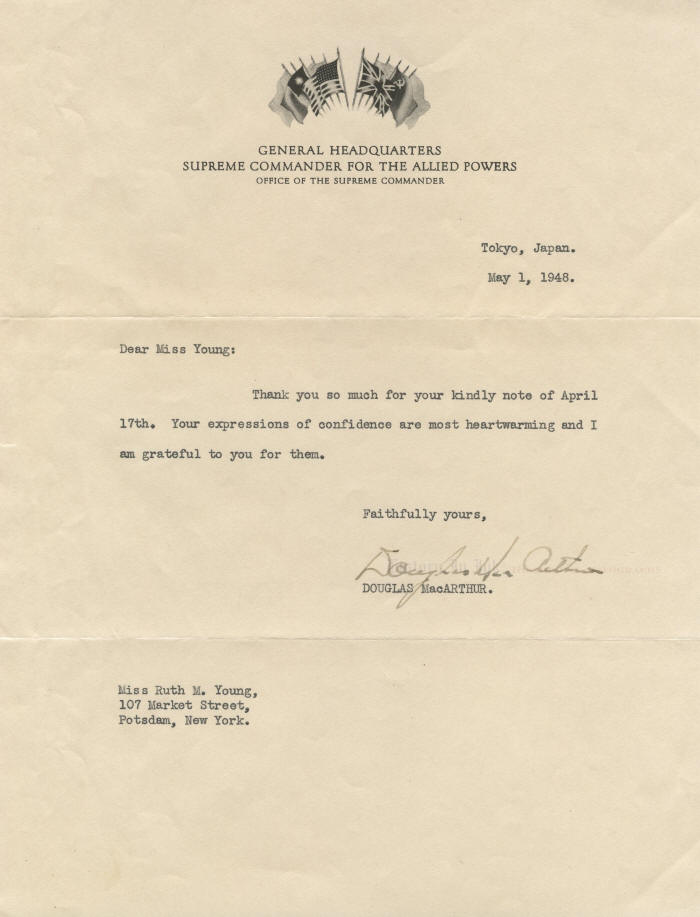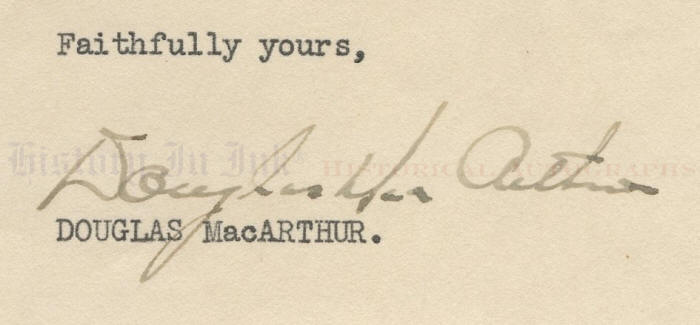

1431481
Douglas MacArthur
As MacArthur seeks the White House:
“Your expressions of confidence are most heartwarming . . . ."
Douglas MacArthur, 1880–1964. General of the Army. Typed Letter Signed, Douglas MacArthur, one page, 8" x 10½", on stationery of the General Headquarters, Supreme Commander for the Allied Powers, Office of the Supreme Commander, Tokyo, Japan, May 1, 1948.
This letter undoubtedly relates to MacArthurʼs aborted bid for the White House in 1948. He writes, in full: "Thank you so much for your kindly note of April 17th. Your expressions of confidence are most heartwarming and I am grateful to you for them."
Some had promoted a MacArthur candidacy against Franklin D. Roosevelt in 1944. Four years later, Roosevelt was dead, and like virtually everyone else, the Republican MacArthur was convinced that his successor, President Harry S. Truman, could not be elected and that 1948 would be a Republican year. MacArthur, then the Supreme Commander and the ruler of postwar occupied Japan, had designs on ruling the United States instead.
Riding a March 1947 Gallup poll that named him the person Americans most admired, MacArthur began to let people know that he was interested in the White House. On July 25, 1947, Truman wrote in his diary, he and General Dwight D. Eisenhower “discussed MacArthur and his superiority complex." Truman offered to run as vice president with Eisenhower at the head of the Democratic ticket should MacArthur join the race as a Republican. “Ike & I think MacArthur expects to make a Roman Triumphal return to the U.S. a short time before the Republican Convention meets in Philadelphia,” Truman confided. “I told Ike that if he did that that he (Ike) should announce for the nomination for President on the Democratic ticket and that Iʼd be glad to be in second place, or Vice President. I like the Senate anyway. Ike & I could be elected and my family & myself would be happy outside this great white jail, known as the White House." By October, Secretary of Defense James Forrestal noted in his own diary that Eisenhower reported upon his return from Tokyo that Truman must “face the prospect of MacArthurʼs returning here in the spring to launch a campaign for himself"—all the while MacArthur was warning Truman that Eisenhower was running.
Although the Pentagon prohibited political involvement by military officers, by late 1947 MacArthur let visiting Americans know that he was interested in the presidency. In early 1948, a meeting of MacArthur For President delegates from 16 states, meeting in Milwaukee—Wisconsin was MacArthurʼs titular home state—proposed a slate of MacArthur delegates in the April Wisconsin presidential primary. On March 8, the day that Truman announced that he would stand for election, MacArthur released a rather coy statement that, reading between the lines, made clear his desire to run:
I have been informed that petitions have been filed in Madison signed by many of my fellow citizens of Wisconsin, presenting my name to the electorate for consideration at the primary on April 6th. I am deeply grateful for this spontaneous display of friendly confidence. No man could fail to be profoundly stirred by such a public movement in this hour of momentous import, national and international, temporal and spiritual.
While it seems unnecessary for me to repeat that I do not actively seek or covet any office and have no plans for leaving my post in Japan, I can say, and with due humility, that I would be recreant to all my concepts of good citizenship were I to shrink because of the hazards and responsibilities involved in accepting any public duty to which I might be called by the American people.
MacArthur won 33.98% of the Wisconsin primary vote but only eight delegates, far behind former Minnesota Governor Harold Stassenʼs 19. Stassenʼs surprise victory damaged MacArthur, whose supporters had spent considerable time and energy on Wisconsin. But two days later, on April 8, MacArthur sent the head of the Nebraska MacArthur For President committee a telegram saying that he was still in the race. He finished fifth in Nebraska on April 13.
It was during this tie that MacArthur received and answered this letter. The correspondent wrote him on April 17. Owing to the time for the letter to reach Japan, MacArthur did not reply until May 1, after he had competed in two more primaries, New Jersey on April 20 and Pennsylvania on April 27.
Overall, MacArthur garnered 87,839 primary votes, while California Governor Earl Warren led with 771,295 and Stassen received 627,391. New York Governor Thomas E. Dewey, the eventual Republican nominee, received 330,799. MacArthur, perhaps sensing a possible deadlock at the convention, he remained in the race and was nominated by General Jonathan Wainwright. He received 11 votes on the first convention ballot and second. The Republicans nominated the liberal Dewey unanimously on the third ballot, and Dewey balanced the ticket geographically by choosing the popular Warren, another liberal, as his running mate. Philippine lawyer Colonel Courtney Whitney, an aide to MacArthur, said that he had “never seen the General look so disappointed."
MacArthur again unsuccessfully sought the presidential nomination in 1952. He retired from active service and became an officer of a large business corporation. He died in 1964.
This letter has 12 flags in the letterhead, including identifiable ones of the United States, the Republic of China, Great Britain, and the Soviet Union. It has two horizontal mailing folds, neither of which affects either the text or MacArthurʼs brown ink signature; a tiny ⅛" marginal tear in a blank area at the left; and a few handling marks, particularly at the left side. Overall it is in fine condition, and MacArthurʼs signature is extra fine.
Unframed.
_____________
This item has been sold, but
click here to see other
American History items
that we are offering.



